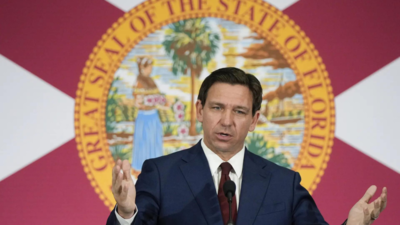ARTICLE AD BOX

Florida budget puts millions in reserves as economic uncertainty brews. Here's a look by the numbers(AP Photo)
On the 105th day of what was supposed to be a 60-day session, Florida lawmakers gave final approval to a leaner state budget totalling $115.1 billion, marking the end of a law making season that was largely defined by inter-party clashes in the Republican-dominated capitol. The new budget lacks some of the top priorities of legislative leaders and Republican Gov. Ron DeSantis, coming in $500 million less than the governor's proposed budget, and $3.5 billion less than last year's adjusted total, a goal of conservative lawmakers focused on scaling back state spending amid concerns of a broader economic slowdown. The state's legislative leaders had debated for weeks over competing tax cut proposals, initially pushing for broad sales tax relief for everyday Floridians before settling on a package that mostly benefits businesses. "I don't view this on day 105 as a failure," Republican Senate President Ben Albritton said. "We dug in deep." The budget now goes to the governor, who has the power to veto individual line items and is known for slashing into lawmakers' spending plans. Here's a look at Florida's budget by the numbers. A $115 billion budget While political and tropical storms loom on the horizon, Florida's legislative leaders have largely downplayed concerns about how President Donald Trump's aggressive and unpredictable economic policies could impact the state's budget, even as he pledges to phase out the federal agency that responds to hurricanes and other disasters that batter the state.
But lawmakers have taken steps to shore up reserves, as forecasters warn of a busier than usual hurricane season and as economists fret over Trump's trade wars and a sweeping proposal to cut federal taxes and spending. Lawmakers crafted a compromise budget and tax cut package, which would save taxpayers and reduce state revenues by an estimated $1.3 billion a year, according to legislative staff. They've also taken steps to set aside an additional $750 million a year into a reserve fund for emergencies, pending voter approval. Republican House Speaker Daniel Perez said building up the reserves is about "being prepared for the unexpected." "None of us know what the future holds," Perez said. $750 million a year The legislature advanced a proposed constitutional amendment that would set aside $750 million a year - or an amount equal to up to 25% of the state's general revenue, whichever is less - into a reserve fund that lawmakers could only use for emergencies.
The measure has to be approved by 60% of Florida voters to be implemented. The last time state officials tapped into the budget stabilization fund was in 2008, as the Great Recession blasted through Florida's tourism and development-heavy economy. Boosting the reserves is a prudent move, said Republican House Budget Committee Chair Lawrence McClure, and another way to cut state spending. "We are doing this so that are we are truly prepared for a break the glass situation," McClure said. Democrats have called the reserve fund a "lock box" and said lawmakers should keep the funds on hand to support needy Floridians, at a time when many residents are priced out of their homes and schools and prisons are struggling to keep staff on the job. Tax breaks for families and corporate interests The Florida House had initially called for cutting the state's overall sales tax from 6% to 5.25%. A competing offer in the state Senate called for a tax break on clothing purchases under $75.
Instead, the largest tax break lawmakers approved was for companies, by eliminating the state's business rent tax. They also approved tax cuts for a slate of special interests including casinos, airlines and NASCAR. Florida residents will get sales tax relief on hurricane supplies, sunscreen and bug spray, and a tax exemption on clothes and school supplies each August. $4 billion for school vouchers State lawmakers are setting aside $4 billion for scholarships for private and religious education, two years after the Legislature expanded the state's voucher program to make all K-12 students eligible, regardless of family income.
Since then, the state's indirect spending on private school tuition and home schooling costs has risen dramatically, which critics warn is burning through the state's budget. More than 2,200 state jobs eliminated Part of state lawmakers' push to cut back on what they see as government bloat is eliminating 2,238 vacant positions across state agencies from the department of health to the department of children and families.
Many of the positions being cut have been vacant for three months. While the number of state jobs shrinks, state workers will receive an across-the-board 2% raise, while state law enforcement officers and firefighters will get a 10% total raise, and a 15% raise if they've been on the job for at least five years. $3 million for immigration detention at local jails The Legislature is also setting aside $3 million in grants for local jails that have contracted with the federal government to support immigration enforcement efforts. Florida has rushed to help the Trump administration carry out its mass deportation agenda and now leads the country in the number of local and state agencies signing on with the federal government to deputize their officers to carry out immigration enforcement.



.png)
.png)
.png)
















 5 hours ago
5
5 hours ago
5









 English (US) ·
English (US) ·